Can Dogs Eat Kiwi Safely? Is Kiwi Good Or Bad For Dogs?
When you purchase through links on our site, we may earn a commission. Here’s how it works.
Can dogs eat Kiwi? If you are here, you are asking that very question! I’m sure most of us are familiar with the kiwifruit, often referred to as just kiwi and also known elsewhere by the name Chinese gooseberries. These small-sized fruits are (usually!) a vibrant bright green on the inside with fuzzy brown skin. They also come in many other varieties such as the golden kiwi, purple kiwi and also kiwi berries which when ripe are only the size of a grape!
Table of Contents
Delicious and exotic in flavor and appearance, they’re a popular and tasty fruit which is also rich in vitamins C and K. But the question is, can we feed kiwi to our dogs?
We love our dogs – we share our lives with them and often our food which isn’t necessarily always the best idea. There are many foods out there, including chocolate and even some natural fruits and vegetables, which are toxic to our pets and must be avoided. However, there are also lots of foods that they can enjoy in small amounts. Kiwi fruits are fortunately one of those fairly safe options but there are a few things to consider before you decide to feed it to your dog.
Is Kiwi Good For Dogs?
Similar to Papaya, kiwifruit contains high levels of vitamin C, vitamin K, and some vitamin E along with smaller amounts of other vitamins and minerals. Alongside these, it is mostly made up of water (over 80%!) and carbohydrates (sugars).
It makes a very nutritious and vitamin-rich treat for humans but as we know – the dog’s digestive system and dietary requirements are very different. Keep in mind that the amount of kiwi you feed your dog can also matter. Just as small breed puppies need less food, smaller breeds should eat less kiwi.
Nutritional Benefits of Kiwi
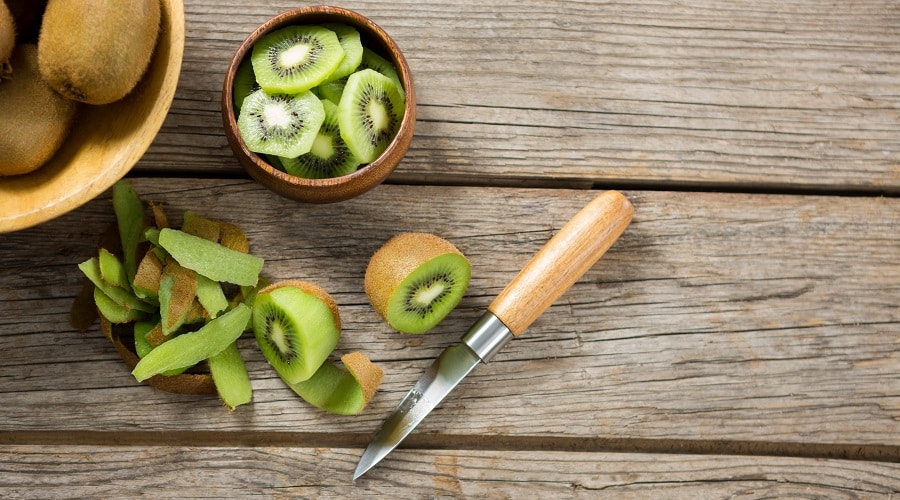
There are many nutritional benefits of serving kiwi to your pup. Kiwi contains vitamins, antioxidants, nutrients, and is a low-calorie snack for your dog. Similar to other fruit like pineapple, it should be given to your dog in moderation. Other great natural snacks for your pup include real sweet potatoes, bell peppers, and even Zucchini. All of those contain vitamins that will boost your dog’s immune system. Let’s take a look at the nutrients in kiwi that can help your pup.
Vitamin C
Vitamin C is a proven antioxidant and in humans is classed as essential, this is because the human body cannot make it by itself and it must be acquired through the food we eat (hence our need for 5-a-day!). However dogs are able to make their own vitamin C- it’s not a requirement for them, and there is little evidence to suggest whether it offers many benefits. However, in the amounts found in fruit it will certainly do no harm.
Vitamin K
Kiwifruit also contains vitamin K which is an important vitamin for blood clotting and can be used (at high doses) to treat certain clotting disorders in dogs. However, the amount contained in kiwifruit is negligible compared with the amount required and although it won’t do any harm it is not recommended as a good source of vitamin K for those dogs that need it.
Water
A dog’s daily water intake should be around 25-50ml/kg per day. That means that a 7.5kg small terrier type should drink around 200-350ml water and a 30kg Labrador may require 750-1500ml water per day. Water requirements fluctuate and depend on lots of other factors such as the weather and temperature outside, amount of exercise the dog has done, age of dog, current diet (wet or dry food) along with other health issues or requirements.
Per 100g of kiwi flesh (the inner green parts) there is approximately 80g (80ml) of water. So although kiwi will not provide anywhere near the daily requirements of water it may (in small amounts) be a refreshing treat and supplement water intake.
Digestive Enzymes
Kiwifruit contains an enzyme called actinidin which helps to break down proteins, such as those in meat. In humans it has been shown to assist with protein digestion in the stomach and small intestine; improving digestion, reducing gastrointestinal discomfort and bloating. Enzyme boosts are frequently added to dog food that helps mitigate flatulence for gassy pups.
There is a small chance some of these effects may be seen in our canine friends. It’s important to note that this hasn’t been investigated or reported in dogs. Given that our dog’s diets are high in protein their digestive tracts are well equipped to handle Kiwi. It is unlikely that kiwi given as a treat or snack will have much of a negative influence on their digestion.
It’s worth noting that if you already feed your dog a premium brand of dog food, these dry kibbles likely already contain probiotics and digestive enzymes. Kiwi can still provide other antioxidants though. You just may not see a huge digestive benefit by adding kiwi to your dog’s diet.
High Fiber
Can dogs eat kiwi to help with increasing fiber? Yes! The fuzzy skin on the kiwi is, in fact, edible, although many people choose not to consume it due to the texture. Kiwifruit has high fiber content – both soluble and insoluble. This kiwifruit fiber also results in the retention of water within the gut contents. In humans, this has been shown to slow down gut transit time (the time it takes for food to pass through the whole length of the gut).
Fiber has also been known to alter the consistency and size of the feces (poo!) passed. However – a study in rats (not dogs!) showed that kiwifruit had little to no effect on transit time. This makes it slightly difficult to know for sure how it would affect dogs.
Depending on the amount of this fiber consumed and the size of the dog it may cause an increase in the amount or frequency of feces passed. However, there is the potential for it to have an undesirable laxative effect resulting in diarrhea and in severe cases this could cause dehydration and illness, requiring veterinary treatment.
It is fair to say that at the correct levels there may be a dietary benefit from the fiber consumed. It is difficult to know what this level is and whether the benefits would outweigh the potential side-effect for your dog. This means it needs to be assessed on an individual basis. There may be a fine balance between producing good quality poop and explosive diarrhea! If your pup lacks fiber, there are also dog foods that have a fiber boost to assist in regularity.
Is Kiwi Safe For Dogs?
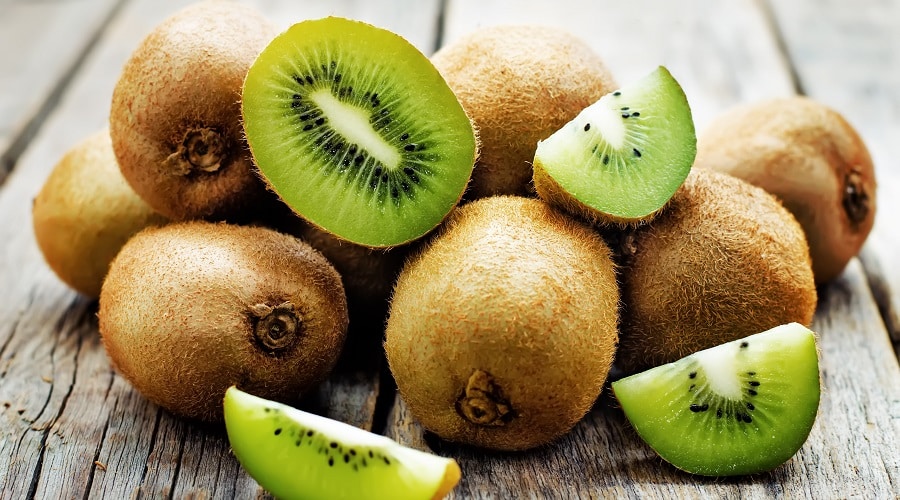
Due to the size of the kiwi there is the potential for it to act as a foreign body and cause a blockage in your dog’s stomach or intestines. It is unlikely that the kiwi would be swallowed whole without any chewing at all. But you can never put this past some dogs!
The high insoluble fiber content in the skin means that it is not easily digestible and once the softer green parts have been digested there is a risk it may collect together and form a blockage in the gut. Both ends of the kiwi are very hard and particularly in smaller dogs, this may present as either a choking or blockage risk.
Blockages of the gastrointestinal tract can be very dangerous. They often require major surgery to treat them, and they can be responsible for the death of a dog. Any episodes of persistent vomiting, diarrhea or abdominal discomfort should always be discussed with your vet immediately. This is particularly important where there’s any chance they may have eaten something they shouldn’t!
Can Kiwi Kill My Dog?
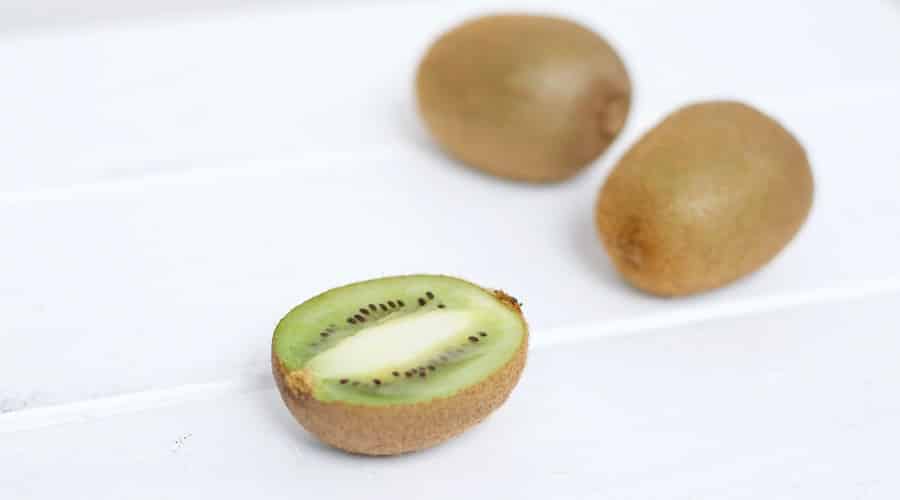
Can dogs eat kiwi without extreme harm? Fortunately, Kiwi is safe for dogs to eat. Although it can cause problems for dogs these are usually mild and self-limiting. However, dogs that have severe side effects or develop a blockage could die. If you notice these effects, seek out an emergency veterinary clinic immediately.
How Should My Dog Test Kiwi?
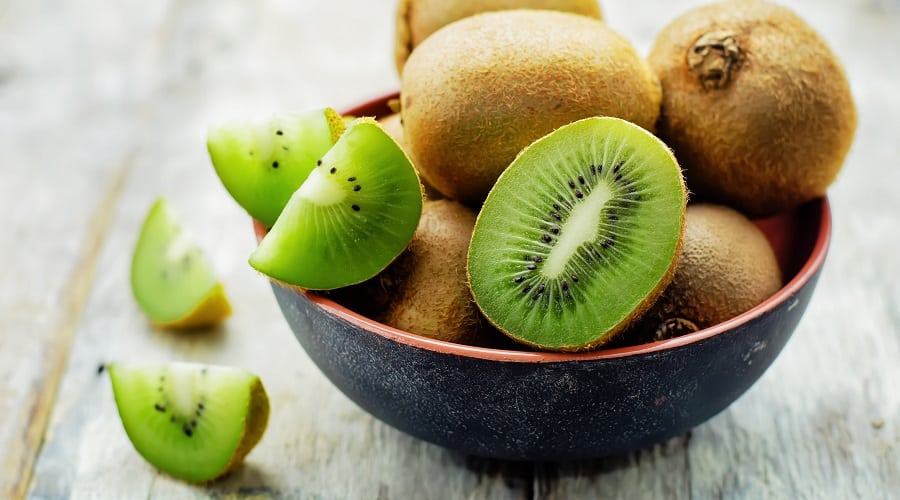
When introducing new food to your dog’s diet there is a chance that it may cause a gastrointestinal upset. For this reason it should always be given in small amounts for the first time. If there are no issues then the amount can be slowly increased over time. Just make sure it’s appropriate and beneficial to do so.
Issues such as vomiting or diarrhea can result. Most of the time these will be self-limiting and resolve with supportive care. This includes a bland diet with plenty of water, as there is a risk of dehydration and deterioration. This is possible in any age of dog but particular care must be taken in puppies or older dogs.
There is always a chance a dog may have a reaction/allergy to a particular food. This means it’s sensible not to offer too many new foods in one go. That way, if an issue does arise, you can be sure which food was responsible and avoid it in the future!
Kiwi Feeding Tips
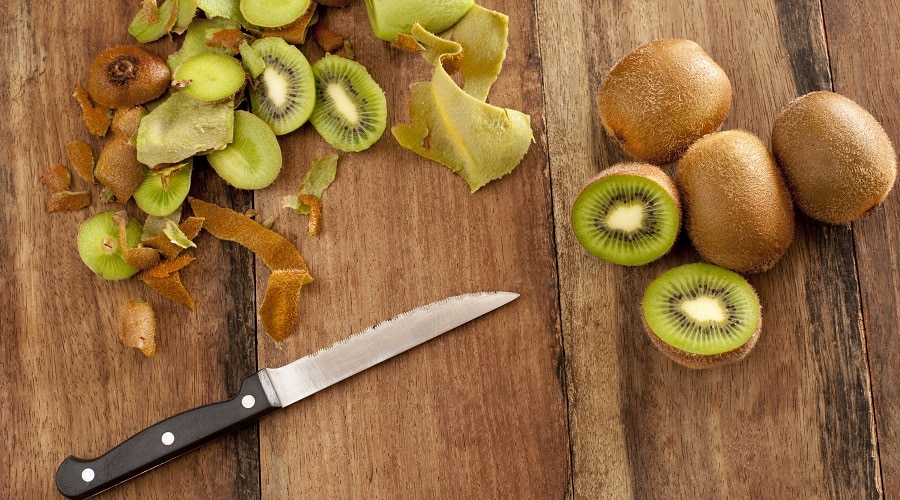
Alongside our dog’s balanced diets we do love to offer them variation and this includes exciting treats. We now know that kiwifruit are packed full of vitamins, fiber, water, may aid digestion and most importantly taste great! Although, you may find that not all dogs like the taste – just like people! If you do choose to feed kiwi to your dog follow our tips:
- Introduce in small amounts only.
- Wash the skin of the kiwi to remove pesticides.
- Cut into small pieces and peel it for easy digestion.
- Always remove the hard ends as the pose a choking/blockage risk.
- Some pups have sensitive stomachs and should avoid Kiwi.
- Frozen Kiwi can make an excellent training treat!
If your dog does develop any unwanted side effects, stop giving the kiwifruit and contact your vet. This is particularly important if symptoms last more than 2-3days. Get to the emergency vet if they are severe. These symptoms include repeated bouts of vomiting, not keeping food or water down, lethargy, or dehydration.
Final Thoughts
Now you know the answer, yes dogs can eat kiwi fruit. As with all things, test your pup slowly to avoid potential stomach problems and allergic reactions. Most dogs will be just fine with the occasional added Kiwi in their diet, but test slowly. If you find that your pup doesn’t react well, we’d recommend trying other natural treats.
Just make sure to stay away from processed foods. Kiwi fruit can be great for dogs, but test first. Kiwi can be a great addition to any diet, and will give your dog a changeup from the normal routine. Just make sure any new food is introduced in moderation.



